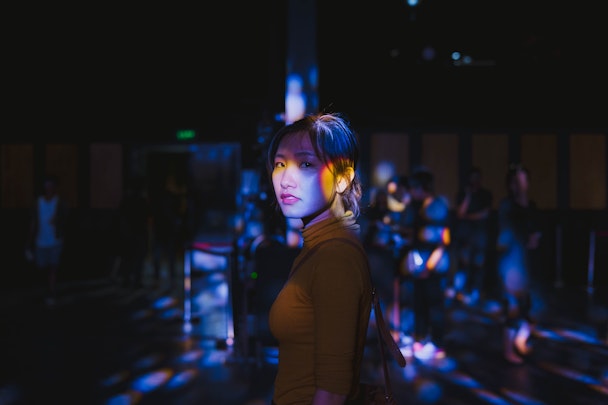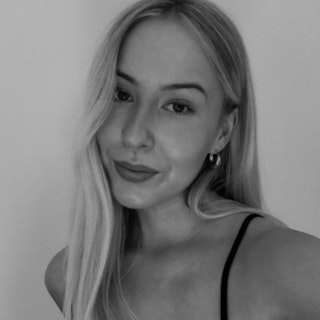Networking, saying no & tackling nepotism: how WOC get promoted, despite the odds
With murky paths to promotion, the creative industry simply isn't built to benefit women of color (WOC). With the help of female leaders from The Drum Network, we look into how they're succeeding in spite of the odds.

Latifa Laanatza of Ledger Bennett asks agencies, “if you’re all white and male, how are you being ambitious?” / Chinh le Duc
Recent years may have felt like a catalyst for change, with companies putting more focus on equity, particularly after George Floyd's 2020 murder. But the lack of senior opportunities for women of color (WOC) in creative industries remains crystal clear.
In 2021, Black women were the lowest earners in creative industries, on an average salary in the UK of £38k ($47k), with white men in the same roles earning the most at £58k ($72k). A similar disparity exists in the influencer space, with Black creators claiming to ‘have to be perfect’ to work with brands.
So, how do WOC move up the ranks? We spoke to five women leaders from the Drum Network about their unique journeys to success.
Does marketing have a nepotism problem?
The word has been bandied around in Hollywood, but nepotism (or something like it) runs rampant in the marketing industry too. Having worked in the UK and the US, Latifa Laanatza, vice-president of people at Ledger Bennett, noticed a pattern.
“Maybe nepotism is too strong a word, but it felt more frequent in the US, which naturally makes diversity hard,” she says.
Speaking hypothetically, Laanatza says, "If 10% of female graduates are Black, one would expect, in a 15-year time period, to see that number of [black female] creative directors. If you don’t, you should ask yourself why”. Laanatza says that the problem is clear: talented WOC are out there; but they aren't getting promoted.
It's a deep-rooted problem in the creative industry, with only 11.4% of industry jobs occupied by Black, Asian and minority ethnic people, and only 11.5% of creative director roles in the US filled by women.
There’s a marked difference between creative and leadership roles, says Laanatza. The former is more hands-on: “It’s easier for them to get settled in a hands-on role because it’s not as easy for them to have their ideas heard as it is as for say, a white man,” says Laanatza.
Lindsay LaBennett, associate vice-president of equity and inclusion at Wasserman, agrees: “When you’re buried in a lot of time-extensive projects that require a good amount of your headspace, when you’re in worker bee mode, it’s hard to demonstrate that you truly are a leader; that you can think like a leader; that you can build a team like a leader”.
Curating your own network
Regarding nepotism, LaBennett says, “It’s not just about who you know, it’s about what they know about you, or what they think they know about you”. When we’re talking about women, especially women of color, we have to be honest about the bias that still exists.
“We’ve seen the whole industry put more focus on creating equitable working environments for all employees,” says Bria Bryant, global chief marketing officer at Assembly Global. "That said, there is still a ton of work to be done, as well as trainings and revised ways of working inside organizations to ensure unconscious biases and stereotypical tropes that hold [women of color] back are checked at the door".
One way in which Ledger Bennett endeavors to make the recruitment process “healthy”, as Laanataza describes it, is by working with organizations like 10,000 Black Interns and colleges with a greater African-American population, to ensure a diverse pool of applicants, letting the company focus on hiring candidates based on credentials.
Autonomy and imposter syndrome
Before being appointed business director at social-first agency Wilderness, Safiya Pomell credits much of her success to freelance work, floating between companies like ITV, ITN and Channel 4. “When you’re freelance, you set your own rates and it’s on you to deliver,” she says. This gave her autonomy, but it wasn’t without challenges.
“I think imposter syndrome is a problem for people who look like me; I don’t remember working with anyone senior that looked like me at ITV. But apprenticeships for people from underrepresented backgrounds can help".
It comes down to a lack of options. ”If you don’t have a strong network, it doesn’t mean you’re not qualified, or even that you’re not deserving of the opportunity. It just means that you don't have the access,” says LaBennett. “For a lot of women of color, if we don’t curate our networks to be dynamic and diverse, it can hurt us in the long run because those networks are what afford us those opportunities.”
For Laanatza, it’s about creating environments in which these women are ”likely to form relationships”, including through educational opportunities for marginalized groups.
Not conforming & learning to say no
Networking and carving out your own career path requires prioritizing personal development and stepping out of people-pleasing mode.
“My dad would say that when you say no to someone – and it’s a real no – it’s always going to feel better than saying yes to something you didn’t want to say yes to,” says LaBennett. “A lot of women find themselves saying, ‘yeah, sure. I’ll join this call. Yes, I’ll work on this project’, when that yes really should have been a no. But we have a really hard time being honest and not feeling a sense of guilt.”
Making that mindset shift isn't easy. Felina Tan, head of client services at Builtvisible, finds that her assertiveness is often received as negative – or even surprising, due to being taken for ‘younger’, as an Asian woman.
“I’ve had instances where I introduce myself as head of client services, and it’s met with ‘Oh’, like it’s a surprise,” she says. “And I think to myself, what the hell is that about? And I’ll go into this combat mode and think, I must bloody prove myself now and talk about the experience I have – and prove I actually deserve to be in this role.”
Diversity of thought
All too often, diversity, equity and inclusion (DE&I) is mistaken for a box-ticking exercise. While being the only person representative of a minority can be, in Tan’s words, “character building”, it can also feel like “an act of tokenism.”
“At Builtvisible, CVs are anonymized for all hiring managers until the first interview is scheduled,” says Tan. “I know that sounds so basic and so obvious, but I’ve never experienced that in my previous agencies in London. I really appreciated it because it means that I’m assessed on my capabilities and my experience, versus my gender, my race, my cultural background.”
Laanatza adds: “I don’t want someone who’s been an account director for 20 years, but I also don’t want to hire someone simply because they’re Black. What I’m trying to achieve is a diversity of thought.”
Diversity isn’t the solution; it’s the outcome. Stripping back CVs, creating more networking and educational opportunities for underrepresented groups, and giving WOC space to work on personal development are healthy steps to getting there.
Closing the Gap is a series shining a light on issues around underrepresentation and the work agency leaders are doing to advocate for change.
Content created with:

Ledger Bennett
We’re Ledger Bennett — a B2B marketing agency and part of the Havas Media Network. We don’t just create campaigns that lead to MQLs, we develop strategies...
Find out more
Wasserman
Wasserman is a global sports, entertainment, and lifestyle marketing agency with expertise in creating connections between brands, properties, talent, and consu...
Find out more
Wilderness
The World's First Social Media Transformation Agency. We transform the strategy, management, and operations of the world’s most beloved brands. Part of the...
Find out more
Builtvisible
We connect a digital society.
Made possible through technology, made personal through data, made powerful through content. Bringing people, communities and...

Assembly
Ad Age's Purpose-Led Agency of the Year. We're the modern alternative, bringing together data, talent, and tech to find the change that fuels growth.
Find out more
